Unit4 History and Traditions Listening and Speaking 课件(共22张PPT,内镶嵌视频和音频)-2025-2026学年人教版(2019)必修第二册
文档属性
| 名称 | Unit4 History and Traditions Listening and Speaking 课件(共22张PPT,内镶嵌视频和音频)-2025-2026学年人教版(2019)必修第二册 | 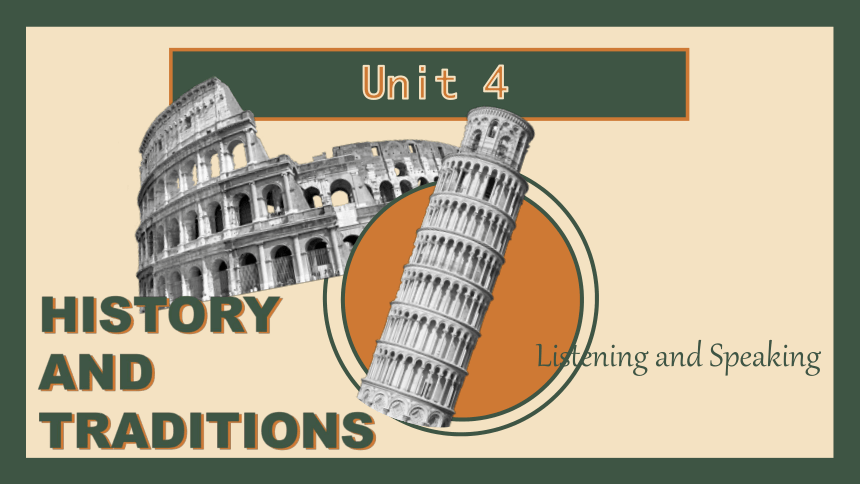 | |
| 格式 | pptx | ||
| 文件大小 | 35.7MB | ||
| 资源类型 | 教案 | ||
| 版本资源 | 人教版(2019) | ||
| 科目 | 英语 | ||
| 更新时间 | 2025-07-18 19:47:38 | ||
图片预览

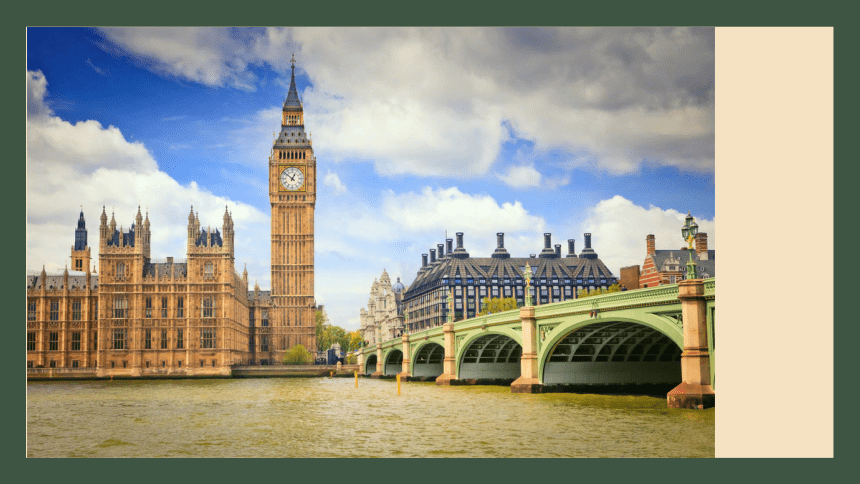
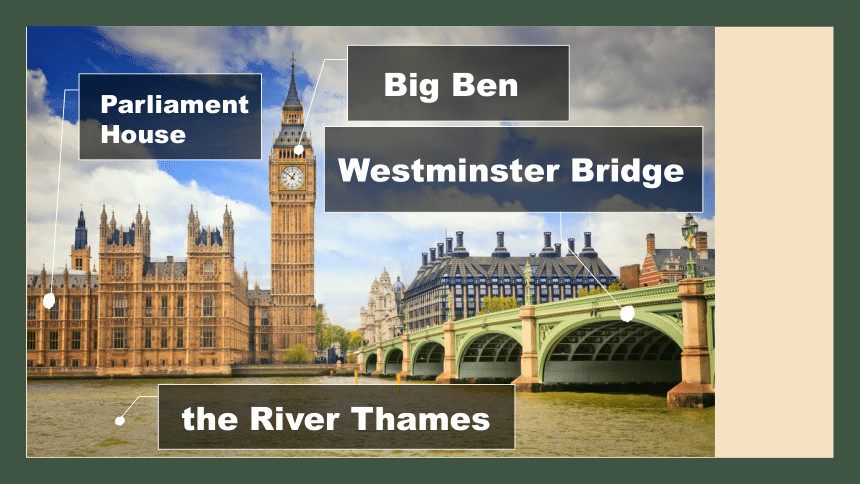
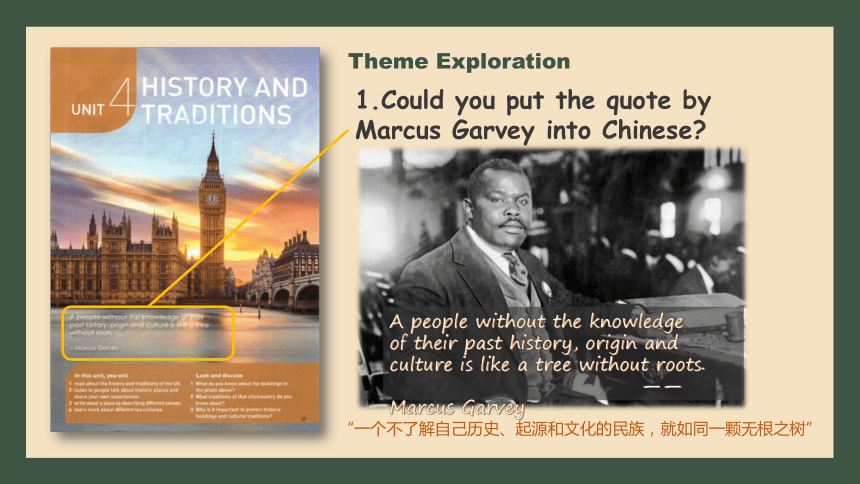
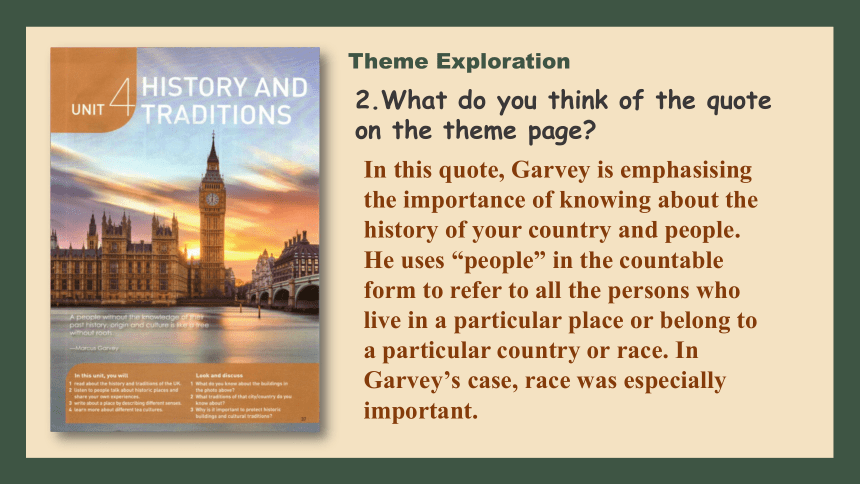
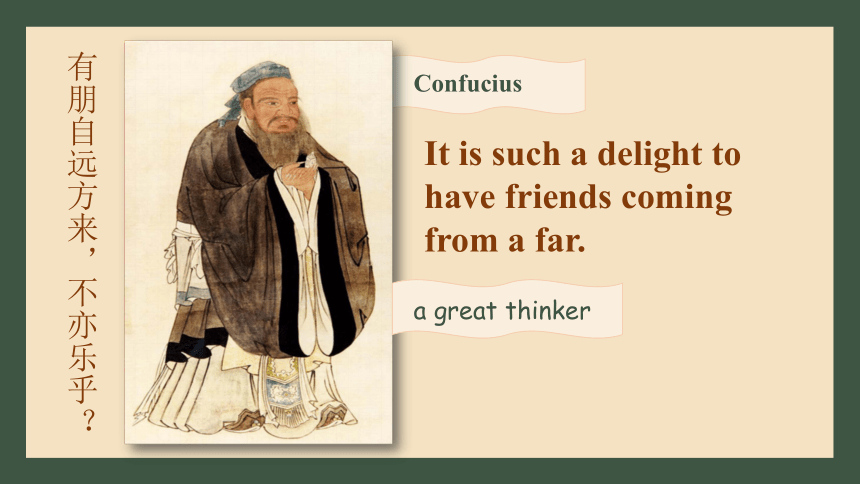
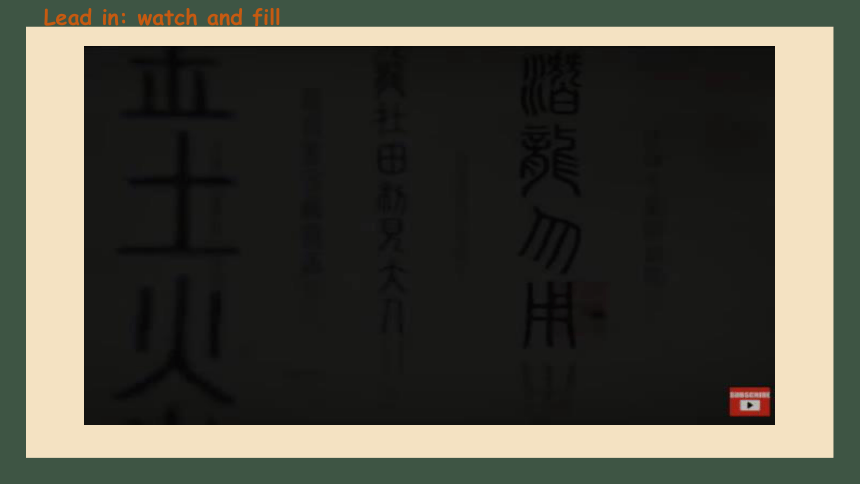
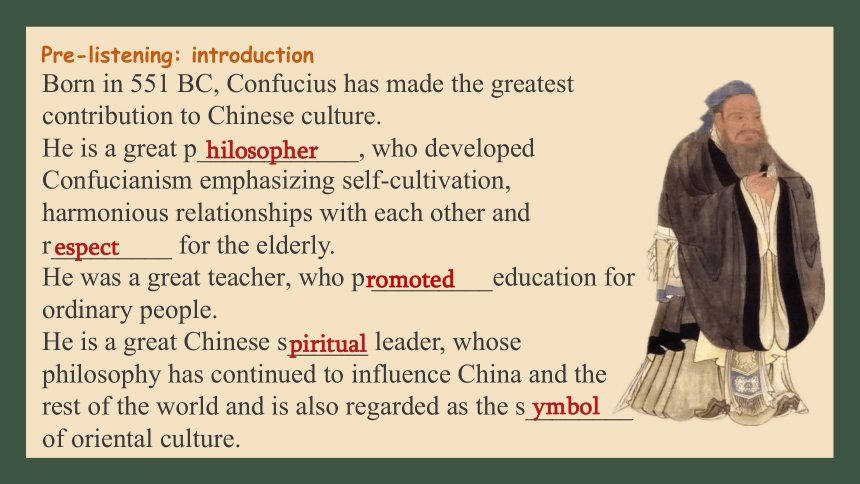
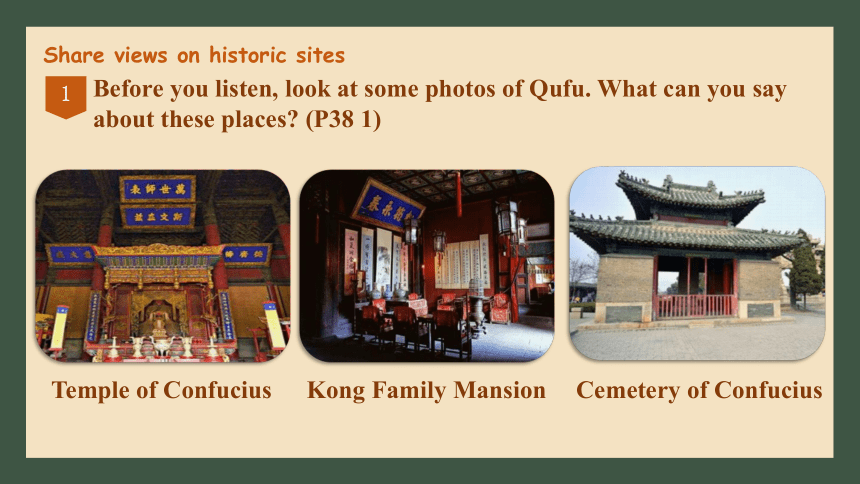
文档简介
(共22张PPT)
Unit 4
Listening and Speaking
HISTORY
AND
TRADITIONS
Parliament
House
Big Ben
the River Thames
Westminster Bridge
Theme Exploration
1.Could you put the quote by Marcus Garvey into Chinese
A people without the knowledge
of their past history, origin and culture is like a tree without roots.
——Marcus Garvey
“一个不了解自己历史、起源和文化的民族,就如同一颗无根之树”
Theme Exploration
2.What do you think of the quote on the theme page
In this quote, Garvey is emphasising the importance of knowing about the history of your country and people. He uses “people” in the countable form to refer to all the persons who live in a particular place or belong to a particular country or race. In Garvey’s case, race was especially important.
Confucius
It is such a delight to have friends coming from a far.
有朋自远方来,不亦乐乎?
a great thinker
Lead in: watch and fill
Pre-listening: introduction
Born in 551 BC, Confucius has made the greatest contribution to Chinese culture.
He is a great p____________, who developed Confucianism emphasizing self-cultivation, harmonious relationships with each other and r_________ for the elderly.
He was a great teacher, who p _________education for ordinary people.
He is a great Chinese s______ leader, whose philosophy has continued to influence China and the rest of the world and is also regarded as the s________ of oriental culture.
hilosopher
espect
piritual
ymbol
romoted
Share views on historic sites
1
Before you listen, look at some photos of Qufu. What can you say about these places (P38 1)
Temple of Confucius
Kong Family Mansion
Cemetery of Confucius
Share views on historic sites
1
Before you listen, look at some photos of Qufu. What can you say about these places (P38 1)
Temple of Confucius
The most famous and largest temple honouring the great sage (圣人), it is also a UNESCO World Heritage Site. It covers 16,000 square metres and has 460 rooms. The main part consists of nine courtyards with several gates. Dacheng Hall stands at the centre and is the principal(主要的) place for offering sacrifices to Confucius.
Share views on historic sites
1
Before you listen, look at some photos of Qufu. What can you say about these places (P38 1)
Kong Family Mansion
Located to the east of the Temple of Confucius, this was the historical home of the descendants (后代) of Confucius from where they managed sites and ceremonies in Qufu. Today it is a museum.
Share views on historic sites
1
Before you listen, look at some photos of Qufu. What can you say about these places (P38 1)
Cemetery of Confucius
This is where Confucius and his descendants are buried. There are more than 10,000 of them, buried here over 2,000 years. The cemetery has had many renovations (翻修) and extensions (扩建) in its history.
Share views on historic sites
2
Listen to a conversation between a British tourist and a Chinese student in Qufu, and then write down what they say about Confucius.
(P38 2)
Fact/Opinion about Confucius
William 1. Confucius is one of his favorite philosopher.
2. He was a ____ man.
3. He lived over_______________________.
Xiao Kong 1. Confucius has over __________ descendants.
2. He was a great __________ and had many ______ about education.
3. He was one of the greatest _______ in history.
2,500 years ago
wise
3,000,000
educator
ideas
minds
Share views on historic sites
3
Listen again and decide whether these statements are true (T), false (F), or not mentioned (NM). Then answer the question. (P38 3)
(1) Confucius said that learning without
understanding leads to confusion.
(2) Xiao Kong is doing a research project on
Confucius philosophy.
(3) As one of Confucius’descendants, Xiao
Kong’s name is recorded in the family tree.
(4) Dacheng Hall is the tallest building in Qufu.
T F NM
T F NM
T F NM
T F NM
reflecting
Confucius’ ideas on education.
Share views on historic sites
3
Listen again and decide whether these statements are true (T), false (F), or not mentioned (NM). Then answer the question. (P38 3)
Why do you think William said his hometown was similar to Qufu
There are famous halls in his hometown.
There are no tall buildings in his hometown.
Both places have a famous person who was born there.
His hometown doesn’t allow other buildings to be more noticeable than the historic buildings
Share views on historic sites
4
Write down the English idioms that are used in the conversation. Explain their meanings and think about some Chinese equivalents. (P38 4)
Understand idioms(习语)
An idiom is an expression which means something different from the meaning of the individual words. Some idioms present an idea or paint a picture that gives a hint as to the meaning. Other idioms can only be understood from the context in which they appear.
Share views on historic sites
4
Write down the English idioms that are used in the conversation. Explain their meanings and think about some Chinese equivalents. (P38 4)
English idiom Meaning Chinese equivalent
Achilles’ heel
pull one’s leg
fish out of water
something that is someone’s weakness
弱点;要害
to joke with someone
戏弄
someone who feels uncomfortable because they are in an unfamiliar place
如芒在背
Discuss the questions in groups.
1. What do you know about Confucius’ ideas on education Think of two or three examples.
Education was one of Confucius’ core values. He believed learning about the past would help us know the future. He also thought education helped bring peace and prosperity. He also thought it was important to use and apply what we have learnt in our education.
What else do you know about Confucius and his philosophy
Confucius was a great thinker, educator, and philosopher. His principles had a great influence on Chinese traditions and beliefs. He believed strongly in strong family loyalty and respect for others. He believed in the so-called “golden rule” of philosophy: Do not do to others what you do not want others to do to you.
1. Learning without reflecting leads to confusion.
学而不思则罔。
2. Review the old and learn the new.
温故而知新。
3. Make no social distinctions in teaching.
有教无类。
4. To learn and at due time to repeat what one has learnt, isn’t that after all a pleasure
学而时习之,不亦乐乎?
Translate the following sentences and think about Confucius’ ideas on education.
2. Think about a historic site that you have visited, and give an introduction to its history and importance.
Unit 4
Listening and Speaking
HISTORY
AND
TRADITIONS
Parliament
House
Big Ben
the River Thames
Westminster Bridge
Theme Exploration
1.Could you put the quote by Marcus Garvey into Chinese
A people without the knowledge
of their past history, origin and culture is like a tree without roots.
——Marcus Garvey
“一个不了解自己历史、起源和文化的民族,就如同一颗无根之树”
Theme Exploration
2.What do you think of the quote on the theme page
In this quote, Garvey is emphasising the importance of knowing about the history of your country and people. He uses “people” in the countable form to refer to all the persons who live in a particular place or belong to a particular country or race. In Garvey’s case, race was especially important.
Confucius
It is such a delight to have friends coming from a far.
有朋自远方来,不亦乐乎?
a great thinker
Lead in: watch and fill
Pre-listening: introduction
Born in 551 BC, Confucius has made the greatest contribution to Chinese culture.
He is a great p____________, who developed Confucianism emphasizing self-cultivation, harmonious relationships with each other and r_________ for the elderly.
He was a great teacher, who p _________education for ordinary people.
He is a great Chinese s______ leader, whose philosophy has continued to influence China and the rest of the world and is also regarded as the s________ of oriental culture.
hilosopher
espect
piritual
ymbol
romoted
Share views on historic sites
1
Before you listen, look at some photos of Qufu. What can you say about these places (P38 1)
Temple of Confucius
Kong Family Mansion
Cemetery of Confucius
Share views on historic sites
1
Before you listen, look at some photos of Qufu. What can you say about these places (P38 1)
Temple of Confucius
The most famous and largest temple honouring the great sage (圣人), it is also a UNESCO World Heritage Site. It covers 16,000 square metres and has 460 rooms. The main part consists of nine courtyards with several gates. Dacheng Hall stands at the centre and is the principal(主要的) place for offering sacrifices to Confucius.
Share views on historic sites
1
Before you listen, look at some photos of Qufu. What can you say about these places (P38 1)
Kong Family Mansion
Located to the east of the Temple of Confucius, this was the historical home of the descendants (后代) of Confucius from where they managed sites and ceremonies in Qufu. Today it is a museum.
Share views on historic sites
1
Before you listen, look at some photos of Qufu. What can you say about these places (P38 1)
Cemetery of Confucius
This is where Confucius and his descendants are buried. There are more than 10,000 of them, buried here over 2,000 years. The cemetery has had many renovations (翻修) and extensions (扩建) in its history.
Share views on historic sites
2
Listen to a conversation between a British tourist and a Chinese student in Qufu, and then write down what they say about Confucius.
(P38 2)
Fact/Opinion about Confucius
William 1. Confucius is one of his favorite philosopher.
2. He was a ____ man.
3. He lived over_______________________.
Xiao Kong 1. Confucius has over __________ descendants.
2. He was a great __________ and had many ______ about education.
3. He was one of the greatest _______ in history.
2,500 years ago
wise
3,000,000
educator
ideas
minds
Share views on historic sites
3
Listen again and decide whether these statements are true (T), false (F), or not mentioned (NM). Then answer the question. (P38 3)
(1) Confucius said that learning without
understanding leads to confusion.
(2) Xiao Kong is doing a research project on
Confucius philosophy.
(3) As one of Confucius’descendants, Xiao
Kong’s name is recorded in the family tree.
(4) Dacheng Hall is the tallest building in Qufu.
T F NM
T F NM
T F NM
T F NM
reflecting
Confucius’ ideas on education.
Share views on historic sites
3
Listen again and decide whether these statements are true (T), false (F), or not mentioned (NM). Then answer the question. (P38 3)
Why do you think William said his hometown was similar to Qufu
There are famous halls in his hometown.
There are no tall buildings in his hometown.
Both places have a famous person who was born there.
His hometown doesn’t allow other buildings to be more noticeable than the historic buildings
Share views on historic sites
4
Write down the English idioms that are used in the conversation. Explain their meanings and think about some Chinese equivalents. (P38 4)
Understand idioms(习语)
An idiom is an expression which means something different from the meaning of the individual words. Some idioms present an idea or paint a picture that gives a hint as to the meaning. Other idioms can only be understood from the context in which they appear.
Share views on historic sites
4
Write down the English idioms that are used in the conversation. Explain their meanings and think about some Chinese equivalents. (P38 4)
English idiom Meaning Chinese equivalent
Achilles’ heel
pull one’s leg
fish out of water
something that is someone’s weakness
弱点;要害
to joke with someone
戏弄
someone who feels uncomfortable because they are in an unfamiliar place
如芒在背
Discuss the questions in groups.
1. What do you know about Confucius’ ideas on education Think of two or three examples.
Education was one of Confucius’ core values. He believed learning about the past would help us know the future. He also thought education helped bring peace and prosperity. He also thought it was important to use and apply what we have learnt in our education.
What else do you know about Confucius and his philosophy
Confucius was a great thinker, educator, and philosopher. His principles had a great influence on Chinese traditions and beliefs. He believed strongly in strong family loyalty and respect for others. He believed in the so-called “golden rule” of philosophy: Do not do to others what you do not want others to do to you.
1. Learning without reflecting leads to confusion.
学而不思则罔。
2. Review the old and learn the new.
温故而知新。
3. Make no social distinctions in teaching.
有教无类。
4. To learn and at due time to repeat what one has learnt, isn’t that after all a pleasure
学而时习之,不亦乐乎?
Translate the following sentences and think about Confucius’ ideas on education.
2. Think about a historic site that you have visited, and give an introduction to its history and importance.
